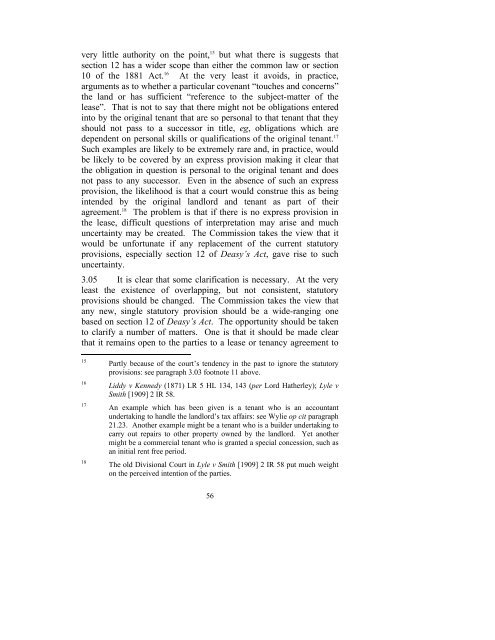Consultation Paper on the General Law of the Landlord and Tenant
Consultation Paper on the General Law of the Landlord and Tenant
Consultation Paper on the General Law of the Landlord and Tenant
You also want an ePaper? Increase the reach of your titles
YUMPU automatically turns print PDFs into web optimized ePapers that Google loves.
very little authority <strong>on</strong> <strong>the</strong> point, 15 but what <strong>the</strong>re is suggests thatsecti<strong>on</strong> 12 has a wider scope than ei<strong>the</strong>r <strong>the</strong> comm<strong>on</strong> law or secti<strong>on</strong>10 <strong>of</strong> <strong>the</strong> 1881 Act. 16 At <strong>the</strong> very least it avoids, in practice,arguments as to whe<strong>the</strong>r a particular covenant “touches <strong>and</strong> c<strong>on</strong>cerns”<strong>the</strong> l<strong>and</strong> or has sufficient “reference to <strong>the</strong> subject-matter <strong>of</strong> <strong>the</strong>lease”. That is not to say that <strong>the</strong>re might not be obligati<strong>on</strong>s enteredinto by <strong>the</strong> original tenant that are so pers<strong>on</strong>al to that tenant that <strong>the</strong>yshould not pass to a successor in title, eg, obligati<strong>on</strong>s which aredependent <strong>on</strong> pers<strong>on</strong>al skills or qualificati<strong>on</strong>s <strong>of</strong> <strong>the</strong> original tenant. 17Such examples are likely to be extremely rare <strong>and</strong>, in practice, wouldbe likely to be covered by an express provisi<strong>on</strong> making it clear that<strong>the</strong> obligati<strong>on</strong> in questi<strong>on</strong> is pers<strong>on</strong>al to <strong>the</strong> original tenant <strong>and</strong> doesnot pass to any successor. Even in <strong>the</strong> absence <strong>of</strong> such an expressprovisi<strong>on</strong>, <strong>the</strong> likelihood is that a court would c<strong>on</strong>strue this as beingintended by <strong>the</strong> original l<strong>and</strong>lord <strong>and</strong> tenant as part <strong>of</strong> <strong>the</strong>iragreement. 18 The problem is that if <strong>the</strong>re is no express provisi<strong>on</strong> in<strong>the</strong> lease, difficult questi<strong>on</strong>s <strong>of</strong> interpretati<strong>on</strong> may arise <strong>and</strong> muchuncertainty may be created. The Commissi<strong>on</strong> takes <strong>the</strong> view that itwould be unfortunate if any replacement <strong>of</strong> <strong>the</strong> current statutoryprovisi<strong>on</strong>s, especially secti<strong>on</strong> 12 <strong>of</strong> Deasy’s Act, gave rise to suchuncertainty.3.05 It is clear that some clarificati<strong>on</strong> is necessary. At <strong>the</strong> veryleast <strong>the</strong> existence <strong>of</strong> overlapping, but not c<strong>on</strong>sistent, statutoryprovisi<strong>on</strong>s should be changed. The Commissi<strong>on</strong> takes <strong>the</strong> view thatany new, single statutory provisi<strong>on</strong> should be a wide-ranging <strong>on</strong>ebased <strong>on</strong> secti<strong>on</strong> 12 <strong>of</strong> Deasy’s Act. The opportunity should be takento clarify a number <strong>of</strong> matters. One is that it should be made clearthat it remains open to <strong>the</strong> parties to a lease or tenancy agreement to15161718Partly because <strong>of</strong> <strong>the</strong> court’s tendency in <strong>the</strong> past to ignore <strong>the</strong> statutoryprovisi<strong>on</strong>s: see paragraph 3.03 footnote 11 above.Liddy v Kennedy (1871) LR 5 HL 134, 143 (per Lord Ha<strong>the</strong>rley); Lyle vSmith [1909] 2 IR 58.An example which has been given is a tenant who is an accountantundertaking to h<strong>and</strong>le <strong>the</strong> l<strong>and</strong>lord’s tax affairs: see Wylie op cit paragraph21.23. Ano<strong>the</strong>r example might be a tenant who is a builder undertaking tocarry out repairs to o<strong>the</strong>r property owned by <strong>the</strong> l<strong>and</strong>lord. Yet ano<strong>the</strong>rmight be a commercial tenant who is granted a special c<strong>on</strong>cessi<strong>on</strong>, such asan initial rent free period.The old Divisi<strong>on</strong>al Court in Lyle v Smith [1909] 2 IR 58 put much weight<strong>on</strong> <strong>the</strong> perceived intenti<strong>on</strong> <strong>of</strong> <strong>the</strong> parties.56
















